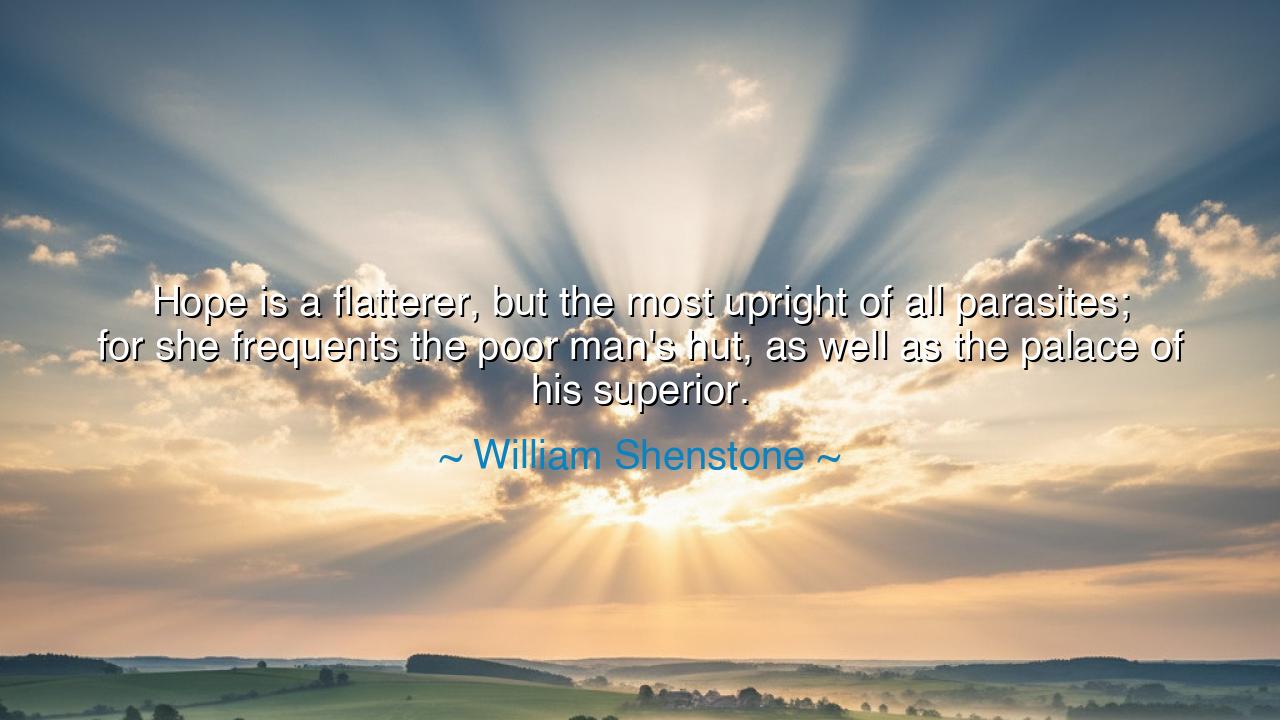
Hope is a flatterer, but the most upright of all parasites; for
Hope is a flatterer, but the most upright of all parasites; for she frequents the poor man's hut, as well as the palace of his superior.






The poet William Shenstone, writing in the eighteenth century, once penned this keen and haunting reflection: “Hope is a flatterer, but the most upright of all parasites; for she frequents the poor man’s hut, as well as the palace of his superior.” In these words, Shenstone captures the double-edged nature of hope—that strange and immortal force that comforts humanity while also deceiving it. He calls her a flatterer, because hope whispers pleasant lies when truth seems unbearable. Yet he calls her the most upright of all parasites, because, though she feeds upon our pain and our longing, she sustains us in our suffering and does not discriminate—she comes to all, whether clothed in rags or crowned in gold.
To understand these words is to glimpse the paradox of the human spirit. Hope is both a blessing and a burden, a healer and a deceiver. She flatters us by promising that tomorrow will be better, that our sorrows will pass, that the impossible might still unfold. And yet, without her, no man or woman could endure the weight of despair. Shenstone, a poet of delicate sensibility and deep melancholy, lived in a world of fragile dreams. His estate, The Leasowes, consumed much of his wealth and left him in debt, yet it was his hope for beauty, meaning, and immortality that kept him alive in spirit. From such a life he learned that hope, though she may flatter and feed upon our yearning, is the noblest of illusions—for she sustains both king and beggar alike.
When Shenstone calls hope a parasite, he does not mean she is evil; rather, he acknowledges her dependence on our suffering. Hope feeds upon need. Where there is no pain, she cannot dwell; where there is no uncertainty, she fades. She visits the poor man’s hut because poverty is a furnace in which the soul longs for relief; and she visits the palace, because even power and wealth cannot protect the heart from emptiness. Thus, she is the equalizer of humankind, moving freely between the grand and the humble, whispering the same promise: “There is still time. There is still possibility.” Hope, then, is both parasite and angel, born from our wounds yet lifting us beyond them.
The ancients, too, knew this paradox. In the tale of Pandora, when all the evils of the world escaped from the fateful jar—disease, envy, despair—one thing remained trapped inside: Hope. Some have said that hope was humanity’s last comfort; others, that she was the final cruelty, prolonging suffering with false promise. Shenstone stands between these interpretations. He neither glorifies hope as divine nor condemns her as deceitful. He sees her as part of the human condition itself: not perfect, not pure, but necessary. Hope flatters, yes—but her flattery gives strength. Her deception keeps despair from consuming the soul.
Consider the life of Nelson Mandela, imprisoned for twenty-seven years in a small cell, stripped of freedom, cut off from the world. By all reason, he should have surrendered to bitterness. Yet it was hope—hope that his nation would one day be free—that kept his spirit alive. Was that hope a flatterer? Perhaps. For many years, it whispered promises that seemed impossible. But when he emerged and saw his people liberated, hope proved herself not merely a deceiver but a companion on the road to endurance. In Mandela’s life, we see Shenstone’s truth: that hope may feed upon us, but she also carries us through the storms of existence.
Shenstone’s description of hope as a flatterer also invites caution. To depend on her entirely is to risk blindness. The one who listens only to hope and not to wisdom may pursue illusions until his strength is gone. Hope must walk beside effort, not ahead of it; she must inspire action, not replace it. The farmer who hopes for harvest without sowing the seed will starve. The soldier who hopes for victory without courage will perish. Shenstone teaches that hope’s highest form is not fantasy but faith combined with labor—the steady will to act despite uncertainty, guided by the belief that something good can yet emerge.
Lesson and Practice:
Let hope dwell within you, but let her not blind you. Welcome her into your heart as both comforter and companion, yet remember that she thrives best when nourished by courage and action. When despair tempts you to surrender, recall that hope has visited kings and paupers alike—that she has lifted nations from ruin and hearts from grief. She may flatter, but she also sustains. Cherish her, but do not worship her. Work with her hand in hand, turning her promises into deeds. For as William Shenstone reminds us, though hope may feed upon our need, she is still our most loyal parasite—the last guest to leave the human soul when all others have gone.






AAdministratorAdministrator
Welcome, honored guests. Please leave a comment, we will respond soon